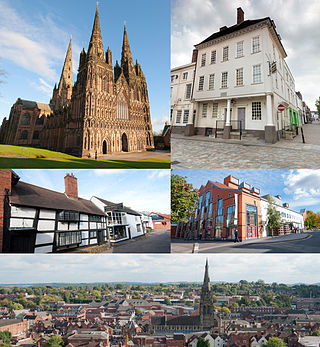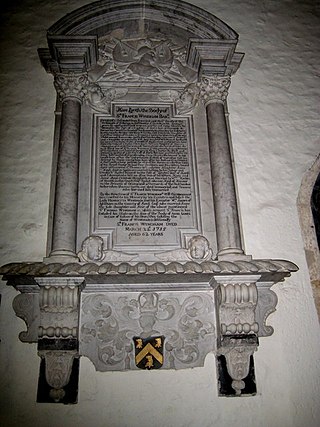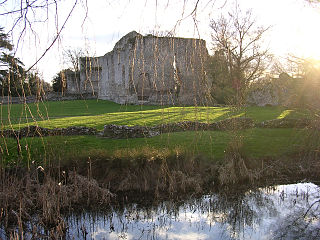Related Research Articles

Staffordshire is a landlocked ceremonial county in the West Midlands of England. It borders Cheshire to the north-west, Derbyshire and Leicestershire to the east, Warwickshire to the south-east, the West Midlands county and Worcestershire to the south, and Shropshire to the west. The largest settlement is the city of Stoke-on-Trent, and the county town is Stafford.

Lichfield is a cathedral city and civil parish in Staffordshire, England. Lichfield is situated 18 miles (29 km) south-east of the county town of Stafford, 9 miles (14 km) north-east of Walsall, 8 miles (13 km) north-west of Tamworth and 13 miles (21 km) south-west of Burton upon Trent. At the time of the 2021 Census, the population was 34,738 and the population of the wider Lichfield District was 106,400.

Burton upon Trent, also known as Burton-on-Trent or simply Burton, is a market town in the borough of East Staffordshire in the county of Staffordshire, England, close to the border with Derbyshire. At the 2021 census, it had a population of 76,270. The demonym for residents of the town is Burtonian. Burton is located on the River Trent 11 miles (18 km) south-west of Derby and 20 miles (32 km) south of the Peak District National Park.
Sir Robert Reynolds (1601–1678) was an English lawyer and Member of Parliament (MP) Long Parliament who took the parliamentary side on the outbreak of the Civil War. He served as Solicitor General and Attorney General during the First Commonwealth and supported the restoration of the Monarchy during the Second.
Sir Henry Lyttelton, 2nd Baronet was an English politician and member of the Lyttelton family. He was a Royalist officer during the English Civil War. After the Restoration, from 1678 to 1679 he sat in the House of Commons.
Sir John Bowyer, 1st Baronet was a 17th-century English soldier and politician.
Sir Richard Weston (1579–1658) was an English judge and politician who sat in the House of Commons variously between 1614 and 1642. He fought on the Royalist side for King Charles during the English Civil War.
Michael Noble was an English puritan who represented Lichfield during the Long Parliament and sided with Parliament during the English Civil War.
Richard Salwey was an English politician who sat in the House of Commons variously between 1645 and 1659. He was a republican in politics and fought on the Parliamentary side in the English Civil War.
Robert Wallop was an English politician who sat in the House of Commons at various times from 1621 to 1660. He supported the Parliamentary cause in the English Civil War and was one of the regicides of King Charles I of England.
Sir Richard Dyott was an English lawyer and politician who sat in the House of Commons between 1623 and 1640. He was a Royalist during the English Civil War.

Sir Francis Wyndham, 1st Baronet of Trent, Dorset was an English soldier and politician who sat in the House of Commons of England at various times from 1640 until his death in 1676. During the First English Civil War, he served as a colonel in the Royalist army and helped Charles II of England escape to France after his defeat in the 1651 Third English Civil War.
Thomas Gewen was an English politician who sat in the House of Commons variously between 1645 and 1660.
Sir William Lewis, 1st Baronet of Llangorse, Brecon and Bordean House, East Meon, Hampshire, supported the Parliamentary cause during the English Civil War. He sat in the House of Commons variously between 1640 and 1677.

The Battle of Burton Bridge was fought between Royalist and Parliamentarian forces at Burton upon Trent on 4 July 1643 during the First English Civil War. By the time of the battle, the town, which had at various times been held by both sides, was garrisoned by a Parliamentarian unit under the command of Captain Thomas Sanders and the town's military governor, Colonel Richard Houghton. The key river crossing at Burton was desired by Queen Henrietta Maria, who was proceeding southwards from Yorkshire with a convoy of supplies destined for King Charles I at Oxford. The Royalists, led by Colonel Thomas Tyldesley, launched a cavalry charge across the bridge which succeeded in defeating the Parliamentarians and capturing most of their officers, including Sanders and Houghton. The Queen's convoy proceeded on its way south to Oxford, with Tyldesley receiving a knighthood and a promotion in recognition of his victory. Burton changed hands several more times during the course of the war, before finally coming under Parliamentarian control in 1646.
John Crofts was an English politician who sat in the House of Commons in 1653 and in 1656. He fought in the Parliamentary army in the English Civil War.
Sir Richard Cave was an English politician who sat in the House of Commons in 1640. He fought on the Royalist side in the English Civil War and was killed at the Battle of Naseby.

Richard Whitehead or Whithed was an English politician who sat in the House of Commons at various times between 1628 and 1653. He fought for the Parliamentary army in the English Civil War.
Thomas Minors was an English merchant and politician who sat in the House of Commons at various times between 1654 and 1660.

Brigadier-General Richard Leveson, 12 July 1659 to March 1699, was the son of a wealthy merchant from Wolverhampton, who served in the army of James II until the November 1688 Glorious Revolution, when he defected to join William III. He fought in Ireland and Flanders, sat as MP for Lichfield and Newport, and was Governor of Berwick-upon-Tweed from 1691 until his death in March 1699.